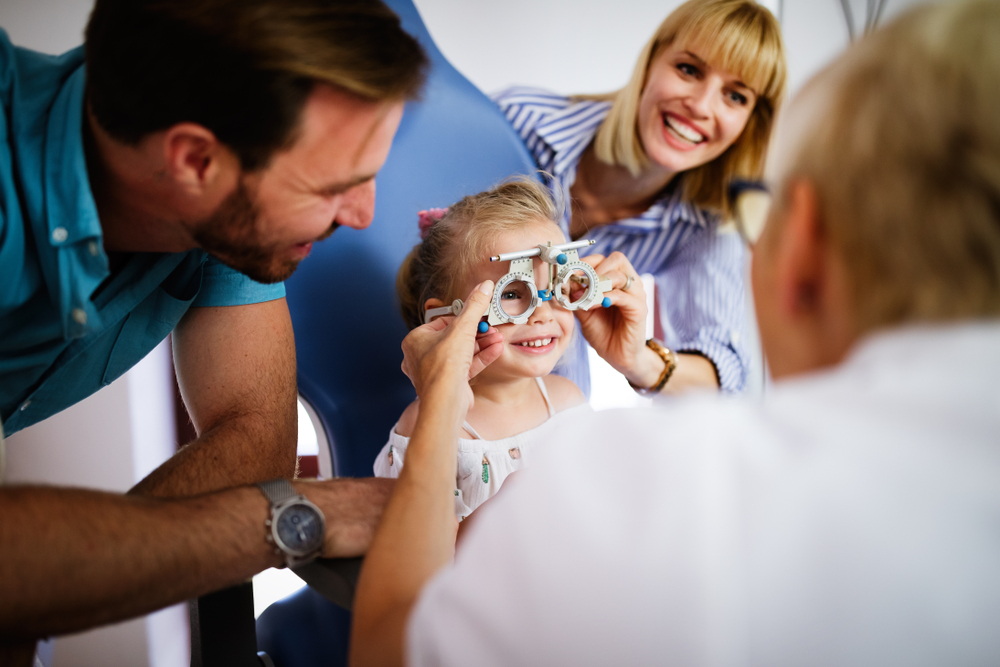
Myopia can impact more than just your child’s ability to see the whiteboard at school or recognize faces from afar. It can also affect their overall quality of life, academic performance, and participation in sports and other activities. Early detection and management are crucial for ensuring your child's visual health and development.
Causes of Myopia in Children
The exact causes of myopia are complex and multifactorial, with both genetic and environmental factors playing roles. If you or your partner are myopic, the chances of your child developing myopia are increased. However, genetics isn't the only piece of the puzzle.
Environmental influences, particularly related to your child's lifestyle, are significant contributors to the development of myopia. Increased screen time on computers, tablets, and smartphones, along with decreased time spent outdoors, have been linked to the rising prevalence of myopia in children. The strain on the eyes from focusing on close objects for prolonged periods can stimulate the eye's growth, leading to myopia.
The lack of exposure to natural daylight is also a culprit. Daylight seems to play a crucial role in eye development and health. Ensuring that your child has a balanced routine that includes time spent outside is an important aspect of myopia management.
Signs and Symptoms of Myopia in Children
Identifying myopia early in your child's life can make a significant difference in managing the condition and maintaining their vision health. Some common signs and symptoms to look out for include squinting, frequent eye rubbing, and the need to sit closer to the TV or computer screen. Your child may also complain of headaches or eye strain, especially after doing close-up work like reading or using a digital device.
Other less obvious signs include a drop in academic performance or reluctance to participate in activities that require distance vision. If you notice your child has difficulties seeing the board at school or is less enthusiastic about playing sports, it might be time to schedule an eye exam with an optometrist.
The Importance of Myopia Management
Managing your child's myopia isn't just about correcting their current vision issues; it's about preventing future complications. High levels of myopia can lead to serious ocular health problems later in life, such as retinal detachment, glaucoma, and cataracts. Effective myopia management can slow down the progression of myopia, reducing the risk of these associated conditions.
Myopia also has a profound impact on your child's social development, educational opportunities, and self-esteem. Children with uncorrected myopia may struggle in school and be less willing to participate in extracurricular activities, which can affect their overall happiness and sense of belonging.
Taking a proactive approach to myopia management can help ensure that your child enjoys a lifetime of better vision and overall well-being. It's an investment in their future that can have far-reaching benefits.
How You Can Help Your Child Manage Myopia
As a parent, you play a pivotal role in managing your child's myopia. Your involvement and support can make all the difference in the effectiveness of the treatment plan prescribed by your optometrist.
First, ensure that your child attends regular eye exams. These check-ups are vital for monitoring the progression of myopia and adjusting their prescription as needed. An optometrist can also recommend specific treatments to slow myopia progression.
Encourage your child to follow good eye care habits. Limiting screen time is another crucial lifestyle change. With the increasing use of digital devices for both education and leisure, it's essential to set boundaries to prevent eye strain and fatigue. Encourage your child to engage in activities that don't involve screens, such as reading physical books, playing board games, or exploring creative hobbies like drawing or painting.
Proper nutrition also supports eye health. Ensure your child's diet is rich in nutrients beneficial for vision, such as omega-3 fatty acids, lutein, and vitamins C and E. A balanced diet can help maintain eye health and potentially influence the progression of myopia.
Lastly, foster a supportive environment by being understanding and patient. Your child may feel frustrated by their vision issues, so providing reassurance and reminding them of the importance of following their management plan can keep them motivated and compliant.
Supporting Your Child's Vision Health
Myopia management for your child is a multifaceted approach that requires awareness, dedication, and a willingness to make lifestyle adjustments. Stay engaged with your child's eye care, foster a balanced lifestyle, and always seek professional advice when needed.
For further guidance on myopia management and how to help your child maintain optimal eye health, visit Monroe Vision Associates at our office in Monroe Township, New Jersey, or call (609) 604-6400 to schedule an appointment today.







